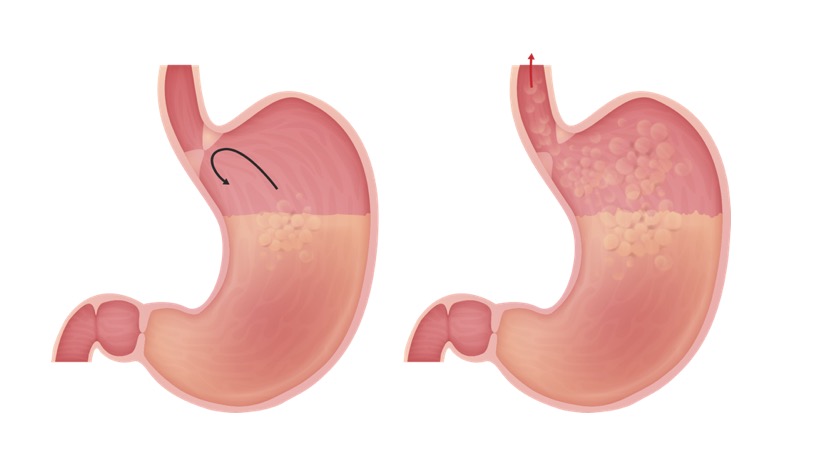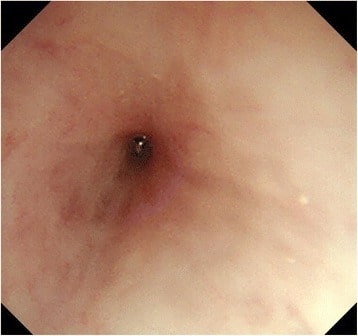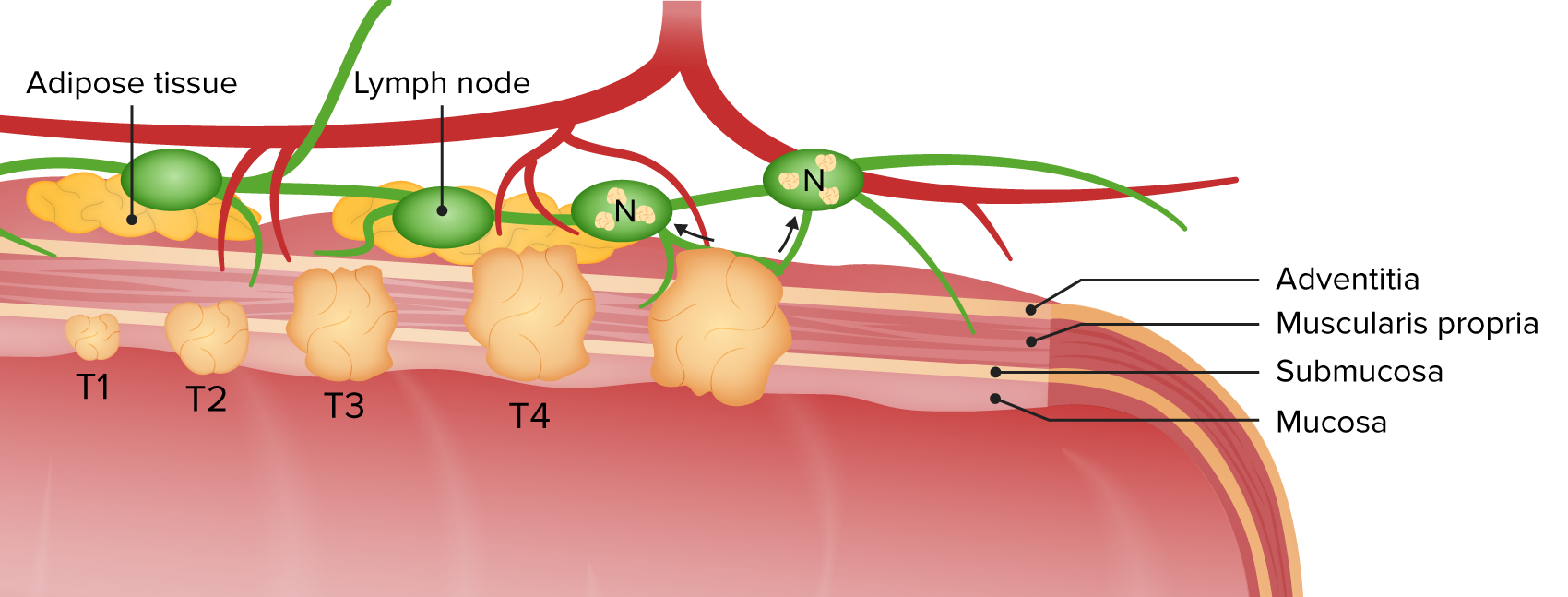Playlist
Show Playlist
Hide Playlist
Esophageal Cancer
-
Slides GD Esophagus.pdf
-
Download Lecture Overview
00:01 Speaking of cancer, let’s move on to talk about esophageal cancer of two major types. 00:08 We had discussed already as to what kind of cancers may then develop due to irritation. 00:15 And by irritation I mean, you have a patient that’s consuming chemicals. 00:19 Such as what? Alkaline, lye type of chemicals, or perhaps even smoking. 00:26 That’s a type of chemical right? The smoke itself that the patient is inhaling. 00:32 Of course some of us… some of this could then be entering the esophagus therefore resulting in irritation quite a bit. 00:40 Alcohol - Alcohol is a chemical, big time, obviously may then cause irritation. 00:47 So whenever there are chemicals that are involved, or even the strictures that we talked about earlier, whenever you have such irritation of that nature taking place persistent and chronically, understand that the type of cancer that you are going to develop or the patient develop will be squamous cell cancer. 01:06 “But Doctor Raj, I had this question. 01:08 I had this patient in which she was drinking alcohol and ended up being where she died of adenocarcinoma of the esophagus." “Okay." Granted there might have been alcohol involved but along with that, what else was she probably doing? She’s probably vomiting quite a bit, a lot of reflux taking place. 01:31 And maybe perhaps she had GERD. 01:34 So it’s not the alcohol that was a predisposing factor to develop adenocarcinoma, alright? Be careful with that one. 01:42 Alcohol consumption, by itself is considered to be a chemical therefore resulting in squamous cell cancer of the esophagus. 01:50 We’ll talk more. 01:51 Chronic upper GI blood loss : Iron deficiency anemia, complication, signs and symptoms. 01:57 Dysphagia progressive from solids to liquids. 02:01 Anytime that the patient’s losing blood, always worry about iron deficiency. 02:05 The clinical features should raise “alarms”. 02:09 Weight loss, pain - often suggest the spread of the tumour beyond the wall of esophagus. 02:15 So remember, this is a very, very fast growing type of cancer. 02:18 It’ll kill you. 02:20 Cough - suggests a malignant trachea-esophageal fistula. 02:25 Hoarseness - may be invasion into the left recurrent laryngeal. 02:29 Radiology : You expect to find well, you do what’s known as esophagram - demonstrate an “apple core” or obstructive mass lesion with esophageal cancer. 02:39 Endoscopy would be definitive diagnosis. 02:41 Radiology would show you, increase your suspicion of. 02:45 However, with definitive biopsy then you would find what’s known as your cancer of what type. 02:53 Well, it depends on the trigger. 02:54 Always pay attention to history for sure, that’ll set the tone. 02:58 Chemicals - you’re thinking more along the lines of squamous cell cancer. 03:04 If it’s reflux for whatever type, or caused by let’s say hiatal hernia in a patient with reflux. 03:13 Maybe there was excess of alcohol binge drinking and so therefore there was vomiting, vomiting, vomiting, vomiting over a chronic period of time, that’s adenocarcinoma. 03:25 Endoscopy has advantage of potentially being a diagnostic and therapeutic procedure. 03:30 So hence, you really want to pay attention to your tool - endoscopy. 03:37 What we’re seeing here would be the “apple core” appearance. 03:40 On your left would be a normal barium swallow. 03:43 So we’re doing a esophagram on your imaging study. 03:47 However, on the right with esophageal cancer, you’ll notice that esophagogram is showing you “apple core” type of appearance. 03:55 Imagine you ate an apple and you eat the core, maybe some of you do but the point is, the description is if you’d leave the core behind. 04:07 That’s what this kind of looks like if you can use your imagination properly. 04:15 Upon endoscopy, you’ll notice here that the orifice is extremely narrow for the esophagus, making it really difficult for at first, what kind of dysphagia? Dysphagia to solids first, progressing on to… look at the caliber, so incredibily narrow. 04:34 So even liquids are having a hard time passing through aren’t they? Progressive dysphagia. 04:39 Esophageal cancer. 04:40 But to understand of what type, you must do endoscopy with biopsy so that you can find the proper histologic pattern of this esophageal cancer. 04:50 The 5-year survival rate - ridiculously poor! 7% to 15% This is scary ladies and gentlemen. 04:58 Surgery is the only curative option. 05:01 Curative would be surgery, but only if the tumour is limited to the esophagus. 05:06 Remember that sometimes you can have these lateral invasion taking place, and also fistula type of formation with the trachea. And that makes it more difficult because that you can’t contain properly. Squamous cell cancer is more radio-sensitive, value of chemotherapy is questionable. So therefore, radiotherapy becomes quite important to you for squamous cell cancer. How did the patient… what was the history in the patient most likely to develop squamous cell cancer of esophagus? Perhaps chemical type of consumption over a long period of time or maybe even peptic strictures that we talked about. Endoscopy can provide palliative therapy. Palliation : So we have laser, dilatation stenting for luminal compromise or fistula formation. Talked about earlier, endoscopy being a very effective tool for palliation. Not only is it responsible for giving a definitive diagnosis but could also assist you with the type of dilation that you’d wish to create so that you can then obviously facilitate transmission of your foods.
About the Lecture
The lecture Esophageal Cancer by Carlo Raj, MD is from the course Esophageal Disease: Basic Principles with Carlo Raj.
Included Quiz Questions
What is the definitive sign that the recurrent laryngeal nerve has been involved in carcinoma of the esophagus?
- Hoarseness of the voice
- Weight loss
- Difficulty swallowing
- Pain
- Cough
A patient comes to the clinic complaining of difficulty swallowing. He states that it started initially with solids and now it has progressed to liquids. What is the MOST likely cause?
- Carcinoma
- Inflammation
- Ulcer
- Acute inflammation
- Infection
What is the definitive diagnostic test used to evaluate esophageal cancer?
- Upper endoscopy with biopsy
- Barium swallow
- X-ray
- CT scan
- None of these
What is the classic radiological sign seen with barium swallow in the setting of esophageal squamous cell carcinoma?
- Apple-core lesion
- Bird's beak sign
- Diffuse dilatation
- Severe ulceration
- Cobblestone pattern
What is the curative treatment option for esophageal cancer?
- Surgery
- Radiation
- Chemotherapy
- Omeprazole
- Proton pump inhibitors
Customer reviews
5,0 of 5 stars
| 5 Stars |
|
2 |
| 4 Stars |
|
0 |
| 3 Stars |
|
0 |
| 2 Stars |
|
0 |
| 1 Star |
|
0 |
Very well explained, makes remembering the difference between the cancers memorable!
Every aspect is accurate and explained well In all aspects






